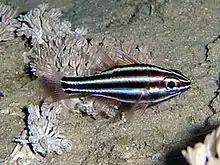Ostorhinchus cookii
Ostorhinchus cookii, common names Cook's cardinalfish, Cook's soldierfish, blackbanded cardinal, blackbanded cardinalfish, is a species of marine fish in the family Apogonidae.[3]
| Ostorhinchus cookii | |
|---|---|
 | |
| Scientific classification | |
| Kingdom: | Animalia |
| Phylum: | Chordata |
| Class: | Actinopterygii |
| Order: | Kurtiformes |
| Family: | Apogonidae |
| Genus: | Ostorhinchus |
| Species: | O. cookii |
| Binomial name | |
| Ostorhinchus cookii W. J. Macleay, 1881[1] | |
| Synonyms[2] | |
|
Amia robusta Smith & Radcliffe, 1911 | |
This species grows to a maximum length of 10 cm. It is a reef fish that is also used in the aquarium industry. Its distribution extends from the Red Sea and the Gulf of Oman south to KwaZulu Natal eastwards into the western Pacific from Japan to the Great Barrier Reef and New Caledonia. It has recently been reported to occur in Tonga and from Persian Gulf.[2] This is a nocturnal species of rocky area sand coral reefs below the low water mark, but no deeper than 10 metres (33 ft) which spends the day near ledges. It lives solitarily or in small groups.[2]
Macleay did not specify who the specific name honours but it is almost certainly Captain James Cook (1728-1779) the British explorer, navigator and cartographer. Cook named the type locality, the Endeavour River in Queensland after his ship, HMS Endeavour, after beaching there for repairs in 1770.[4]
References
- Eschmeyer, William N.; Fricke, Ron & van der Laan, Richard (eds.). "Ostorhinchus cookii". Catalog of Fishes. California Academy of Sciences. Retrieved 22 September 2018.
- Froese, Rainer and Pauly, Daniel, eds. (2018). "Ostorhinchus cookii" in FishBase. June 2018 version.
- "WoRMS - World Register of Marine Species - Ostorhinchus cookii (MacLeay, 1881)". marinespecies.org.
- Christopher Scharpf & Kenneth J. Lazara (31 May 2018). "Order KURTIFORMES (Nurseryfishes and Cardinalfishes)". The ETYFish Project Fish Name Etymology Database. Christopher Scharpf and Kenneth J. Lazara. Retrieved 21 September 2018.